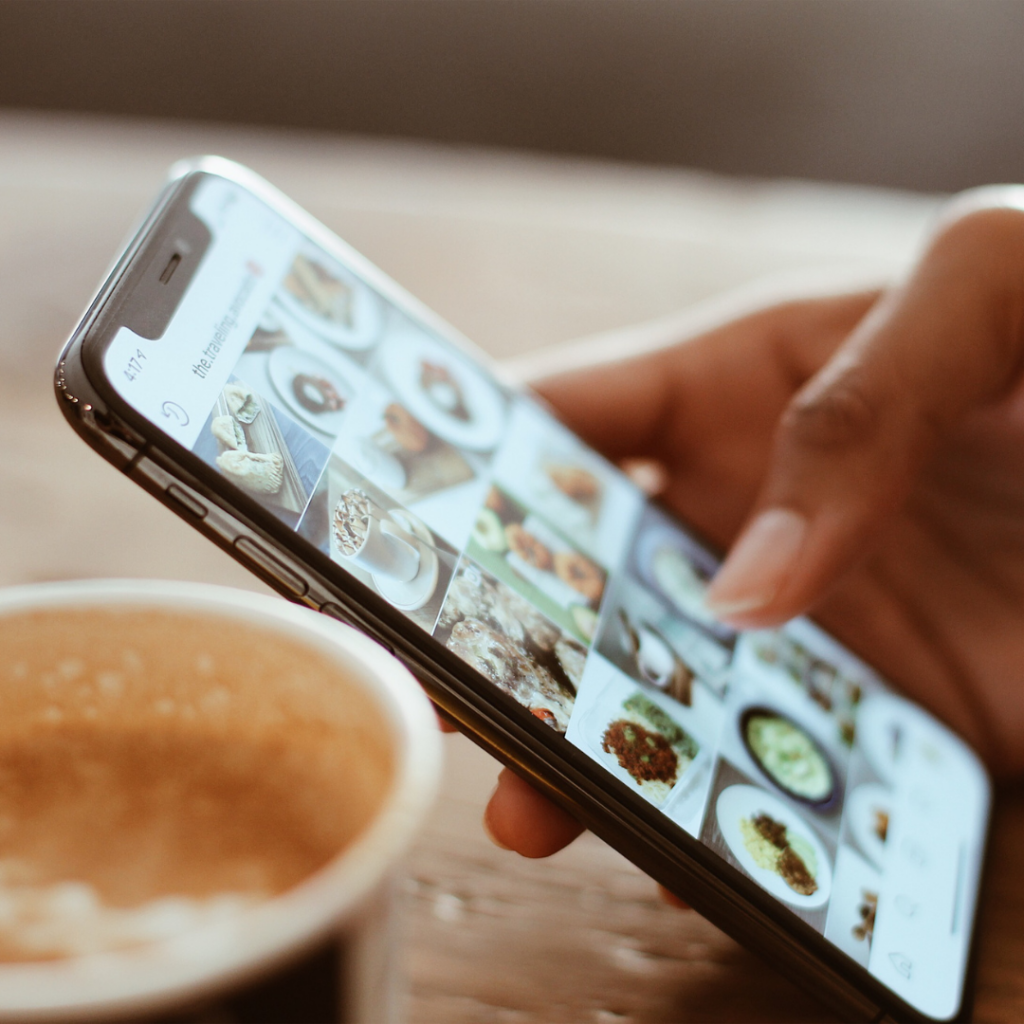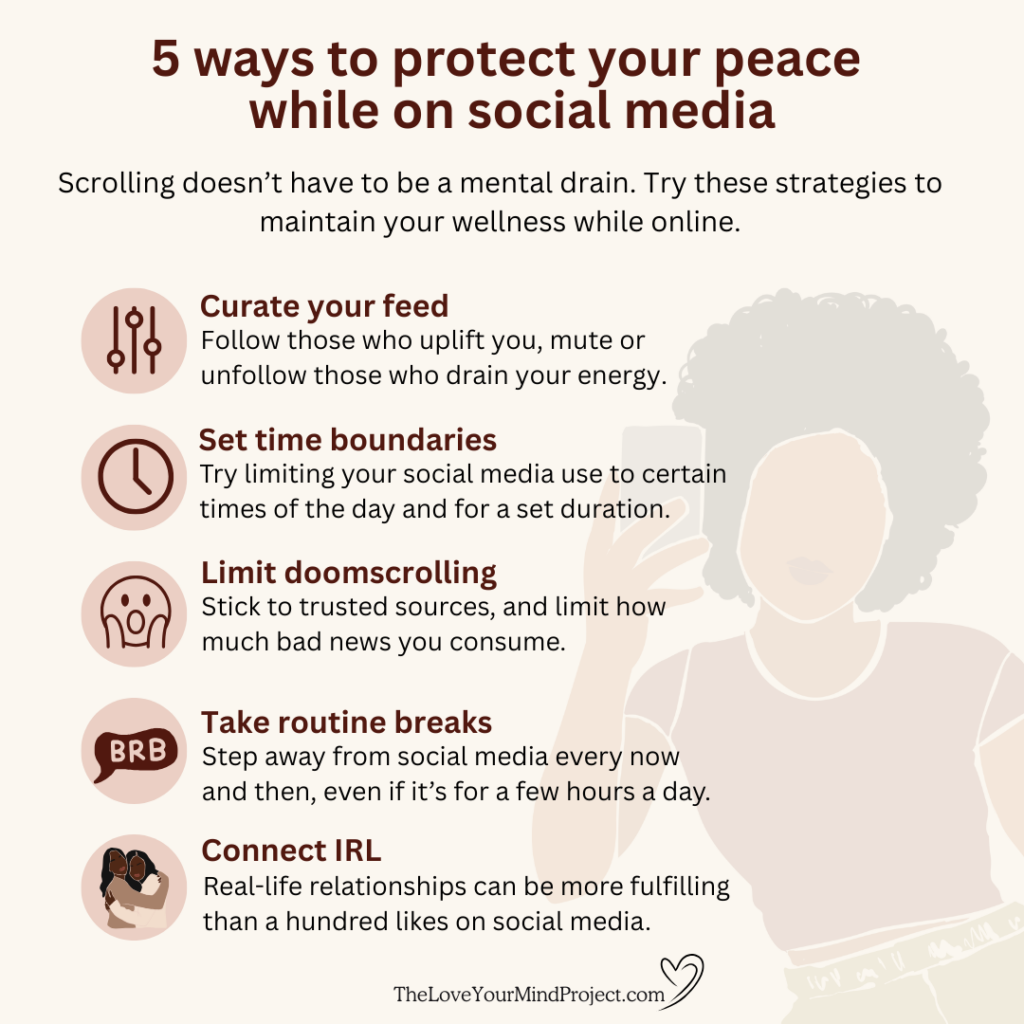- How does anxiety medication work? What Black women should know before we decide - November 29, 2025
- Why do I never feel good enough? What it really means—and how to heal - November 20, 2025
- Why do I always feel alone? Understand what’s happening and how to heal - November 14, 2025
Toxic social media habits can deeply affect your mental health, but does social media cause depression? Short answer: It might.

It’s, of course, difficult to prove that social media causes depression 1. However, for years, studies have linked social media use and depression in young adults 2.
More recent research, like the 2021 Social Media and Self-Reported Symptoms of Depression study, shows that the connection between usage and depression isn’t limited to younger generations. Older adults are at risk, too.
“We’re living in a time where social media influences nearly every part of our daily lives,” said LaMiya Harrison, LCSW-A and therapist at North Carolina-based Counseling Connections Clinical Group. “If you’re consistently engaging with negative or unrealistic content, it can significantly impact your mood and self-worth.”
This article explores how social media can trigger or intensify depression symptoms and how to protect your wellness in the age of extremism, heavy headlines, and excessive filters.
What's in this article?
When we get likes, retweets, or shares, our brains release dopamine, the feel-good chemical, telling us to do that again.
The pleasure we feel from natural actions, like exercise, rest, and meaningful connections, releases dopamine gradually and at sustainable levels. But the good vibes we get from artificial stimulants, like social media, alcohol, and drugs, can hijack the brain’s reward system, causing dopamine levels to spike quickly and then drop to even lower levels than before once the activity stops 3.
Over time, we can become desensitized, needing more likes, comments, and followers to feel good, only to feel even worse when we log off.
>> READ MORE: Black women and depression: Signs the burden is too heavy
Even if you’re not actively posting, excessive social media use can contribute to or worsen depression symptoms. Here’s how.
Comparison
Endless highlight reels can feed insecurities, having you think that your body, relationships, career, and achievements aren’t enough. These constant comparisons can chip away at your self-worth, which can fuel depression symptoms, especially in women 4.
Toxic interactions
It’s easy to be rude online. Whether you’re dishing it, taking it, or simply a witness, repeated exposure to trolling, bullying, and hate-driven responses can negatively affect your emotional well-being 5.
Doomscrolling
Overexposure to tragedies, conflict, and crises can leave your nervous system overwhelmed and on edge. The world starts to feel darker, heavier, and harder to face with too much doomscrolling.
>> READ MORE: Affirmations for anxiety to help quiet your thoughts
Fewer quality connections
Social media is one way to connect. But if it often replaces meaningful, real-life relationships, you may feel isolated and miss out on genuine support.
Disrupted sleep and attention
Scrolling before bed can overstimulate the brain, making it harder to fall and stay asleep. Trouble sleeping, like insomnia, can be a symptom of or a risk factor for depression 6,7.
Pay attention to how you feel during and after engaging on social media platforms. See if you notice any of the following.
- Your self-worth suffers: You compare. You judge yourself and end up feeling unattractive, unsuccessful, and unworthy.
- You feel hopeless: Your newsfeed fuels fear, worry, and anxiety.
- You live for it: You feel pressure to constantly post, reply, or stay updated, and you feel anxious when you don’t.
>> READ MORE: Black women and mental health: Choosing self-love over stigma

5 ways to protect your peace while scrolling
Some may choose to quit social media entirely. If that’s not you, consider these strategies to reduce its impact on your mental health, especially if you deal with depression symptoms.
#1 Curate your network and feed
Follow people who uplift and inspire you, not those who drain your energy or make you question your worth. Be mindful of content that uses fear, outrage, or exaggerated claims to stay viral.
#2 Set time boundaries
Try limiting your social media use to certain times of the day, ideally avoiding right before bed or immediately after waking up. Consider setting a cutoff time so you’re not scrolling endlessly.
#3 Have a plan for doomscrolling
Our brains generally crave updates when bad news breaks 8. Boundaries can be helpful when the bad news feels infinite. Get your news from trusted sources, limit how much you take in, and always check in on how you feel.
#4 Take routine breaks
A social media detox, or time away from the posts, news headlines, and reels, can give your mind space to reset. You can start small with one night a week and fill that time with activities that give you life.
#5 Connect in real life
Nothing beats an authentic connection. Make time for those who see you. A heart-to-heart or simply relaxing with a trusted friend can be more fulfilling than a hundred likes.
You can also get support from a licensed therapist, especially if social media use leaves you feeling low.
“Consider the support of a mental health professional if you notice a persistent low mood, lack of motivation, or are isolating more than usual—also if you experience changes in sleep or appetite,” said Harrison. “However, you don’t have to wait until things feel overwhelming. Early support can make a big difference.”
>> Subscribe for weekly encouragement!
Social media and mental health FAQs
Does social media cause depression?
Excessive social media use can trigger or intensify depression symptoms, although it’s not always the root cause. Several studies have connected depression symptoms with social media use in both adolescents and adults 2,9. Comparison and striving for likes can leave you over-reliant on social media for validation, which can lead to lower self-esteem 10.
Why does social media stress you out?
Social media can be a barrage of information that overstimulates the brain. Much of the information shared is designed to grab your attention, often playing into fear, anxiety, and insecurities to keep you coming back 8. Without time for your mind to rest and reset, you may notice you feel stressed more often than not.
How much social media is too much
Some experts suggest spending no more than two hours a day engaging with social media 11. But it’s less about an exact number and more about how you feel when engaging with social media. If it leaves you feeling drained and miserable after 30 minutes, that may be too much.
What are healthy ways to use social media?
Be intentional and set time limits on your daily social media use. You can also curate your feed to follow people and brands that share positive content. Don’t neglect your real-life support system, and seek professional help if you’re struggling to set boundaries.
Does deleting social media improve mental health?
Deleting social media can improve your mental health, especially if scrolling triggers feelings of worthlessness, anxiety, or hopelessness. Taking a break or removing platforms entirely can give your mind the space it needs to reset and recharge.
References
1 Johns Hopkins Children’s Center Study Shows More Than Just Social Media Use May Be Causing Depression in Young Adults. (2024). Hopkinsmedicine.org. https://www.hopkinsmedicine.org/news/newsroom/news-releases/2024/05/johns-hopkins-childrens-center-study-shows-more-than-just-social-media-use-may-be-causing-depression-in-young-adults
2 Vidal, C., Lhaksampa, T., Miller, L., & Platt, R. (2020). Social media use and depression in adolescents: a scoping review. International Review of Psychiatry, 32(3), 235–253. https://doi.org/10.1080/09540261.2020.1720623
3 Neuroscience and addiction: Unraveling the brain’s reward system | Penn LPS Online. (2025, February 5). Upenn.edu. https://lpsonline.sas.upenn.edu/features/neuroscience-and-addiction-unraveling-brains-reward-system
4 Samra, A., Warburton, W. A., & Collins, A. M. (2022). Social comparisons: A potential mechanism linking problematic social media use with depression. Journal of Behavioral Addictions, 11(2), 607–614. https://doi.org/10.1556/2006.2022.00023
5 Clay, R. A. (2025). That’s just rude. Https://Www.apa.org. https://www.apa.org/monitor/2013/11/rude
6 Treating Sleep Problems May Help Prevent Depression. (2025). Psychiatry.org. https://www.psychiatry.org/news-room/apa-blogs/treating-sleep-problems-may-prevent-depression
7 Depression and Sleep: Understanding the Connection. (2024, June 20). Hopkinsmedicine.org. https://www.hopkinsmedicine.org/health/wellness-and-prevention/depression-and-sleep-understanding-the-connection
8 Blades, R. (2021). Protecting the brain against bad news. Canadian Medical Association Journal, 193(12), E428–E429. https://doi.org/10.1503/cmaj.1095928
9 Perlis, R. H., Green, J., Simonson, M., Ognyanova, K., Santillana, M., Lin, J., Quintana, A., Chwe, H., Druckman, J., Lazer, D., Baum, M. A., & Della Volpe, J. (2021). Association Between Social Media Use and Self-reported Symptoms of Depression in US Adults. JAMA Network Open, 4(11), e2136113. https://doi.org/10.1001/jamanetworkopen.2021.36113
10 Hilliard, J. (2025, March 14). Social Media Addiction. Addiction Center. https://www.addictioncenter.com/behavioral-addictions/social-media-addiction/11 Blog | How Much Screen Time is Too Much for Adults? (2020). Reid Health. https://www.reidhealth.org/blog/screen-time-for-adults
